Breaking the cycle of silence about domestic violence
Domestic violence is such a painful subject that even physicians may hesitate to broach it with patients. Although it's assumed that abused women benefit emotionally and physically from confiding in their physicians, the medical world has still been hesitant to play a role in stopping domestic violence.
Change: Second-year DMS student Meighan Smith hopes to change that. Building on information previously gathered by third-year student Wendy Osterling, Smith is working with Dartmouth family physician Patricia Glowa, M.D., to study female patients who disclose domestic abuse to their doctor.

|
|
In addition to focusing on her studies, medical student Meighan Smith is doing research
on domestic violence, hoping to help physicians help battered women. |
"We're trying to get at outcomes," Smith says. "My hope is that we can come up with some real answers for physicians about what they're going to be able to do to help their patients. Because they have access to intimate aspects of people's lives, physicians have an amazing opportunity to identify violence and try to intervene."
In the study—one of several student research initiatives supported by the Department of Community and Family Medicine —Smith and Glowa will examine women's perceptions of their relationship with their physician before and after they have discussed domestic abuse. They will also study whether women who confide in their physician experience an alleviation of symptoms related to the abuse and whether their situation with the batterer improves.
Handful: Smith says the project is important because little information exists about the health outcomes of abused women. Of the approximately 100 studies about physicians and domestic violence, only a handful address outcomes or the female patient's perspective.
But despite the study's potential, Smith and Glowa have encountered some barriers while organizing the project; Smith attributes this to the sensitive nature of domestic abuse. However, three family practices in the Upper Valley recently made a commitment to participate, and a practice in Concord, N.H., has also expressed interest.
Their hope is that the results from this small study will justify funding for a larger project. Not only do they agree on the work's importance, but they've enjoyed their collaboration. "Meighan . . . brings a level of commitment and enthusiasm to our work that is very much a motivation to me," says Glowa. "She makes me want to achieve a high standard in order to live up to her expectations." And for her part, Smith says of Glowa, "She is an incredible inspiration. She does a lot with the community, but is able to be present with her patients and present as a teacher."
Smith's interest in women's health is long-standing. As an undergraduate at Bryn Mawr, she volunteered at an abortion clinic, coordinated a rape-awareness project, and wrote a senior thesis on sexual violence. And before coming to DMS, she worked in health-care policy at Harvard and as a women's hotline counselor in California. She chose DMS over other medical schools because she saw in the Dartmouth students she met during her interview a strong commitment to volunteerism.
"This research project has reengergized me," Smith says. "It makes me feel like what I'm doing in class is more relevant . . . makes me see where my education will eventually lead."
Katrina Mitchell
If you would like to offer any feedback about this article, we would welcome getting your comments at DartMed@Dartmouth.edu.
